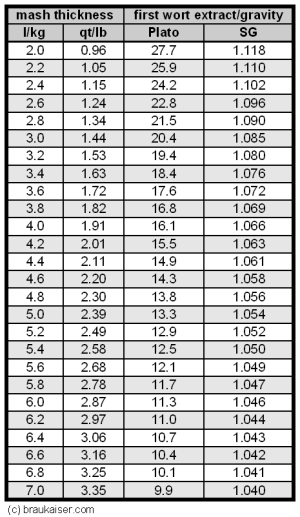I think you know what is coming
A few days back I happened to listen to the “Mash efficiency†BS show. And I couldn't believe my ears when I heard you cite posts I made in a discussion with Jamil on homebrewtalk.com . One of the posts cited was this one: http://www.homebrewtalk.com/f36/brewstr ... ost1491898. And since the other post was mine as well, your further comments were clearly directed at me. Not only did you take a discussion from a bidirectional medium into a unidirectional one, you also went on accusing me of “arm chair quarterbackingâ€, not doing my own experiments, pulling stuff out of my ass and more. Maybe you haven't followed me as I'm certainly not as prominent of a home brewing figure as you two, but why do you think that I don't do experiments if link to my site http://braukaiser.com was only a click away in my signature?
So I decided to do something that I generally stay away from, nitpicking your show:
This show is basically a copy of the BS show on sparging. I cannot shake the suspicion that it was put on the “interwebs†only as a follow up of the discussions we had on http://homebrewtalk.com.There was little additional content to what has already been said in the sparging show.
John got the analysis of the congress mash wrong. When analyzing the congress mash, the volume of collected wort does not matter for the efficiency calculation and therefore the losses in the “spent†grain don't matter either. What matters is the gravity of that wort and the fact that it was taken with a no-sparge from an 8 l/kg mash sample. With this data you can determine the amount of sugar that was extracted. I'll come back to this later as we can make use of this relationship in brewing
You can have looses in both the biochemical part (mashing) and the physical part (lautering sparging). For many home brewers, the problem is actually substantial losses in the mashing part and changing the way they lauter or build their manifold will do little for improving the efficiency.
Jamil, funny that you started mentioning spraying the malt with water. I have been suggesting this since the beginning of last year after I found it in a brewing text. I call it malt conditioning since wet milling is actually done with malt submerged in water and an impractical mess for the home brewer. I have an article and pictures here: http://braukaiser.com/wiki/index.php?ti ... nditioning. A lot of brewers have told me in person or via e-mail/forum posts that it helped them a lot.
The gravity of the first runnings is not always 1.077. It depends on 3 factors: your mash thickness, grist composition and conversion efficiency. The latter is a concept that I introduced last year to express the level of starch conversion that has happened in the mash. Contrary to common belief the starch conversion in the mash is not necessarily complete. Mash parameters like mash pH, mash thickness, time, temperature and most of all crush can have a fairly big impact on it. It can be determined with a “mash gravity test†(kudos to the guys from the NB forum for that name) where you use the following chart to find the maximum first wort or mash gravity based on your mash thickness:
 and put that in relation with the actual mash or first wort gravity. That gives you what I call conversion efficiency which can be as high as 100% and which lays the foundation for your efficiency into the kettle. What will be subtracted from this efficiency as you lauter the extract into the kettle are the lautering losses which are unavoidable if you want to have good wort quality. You can find more on that subject including a method for determining the efficiency of the lauter in these two articles: http://braukaiser.com/wiki/index.php?ti ... Efficiency and http://braukaiser.com/wiki/index.php?ti ... Efficiency.
and put that in relation with the actual mash or first wort gravity. That gives you what I call conversion efficiency which can be as high as 100% and which lays the foundation for your efficiency into the kettle. What will be subtracted from this efficiency as you lauter the extract into the kettle are the lautering losses which are unavoidable if you want to have good wort quality. You can find more on that subject including a method for determining the efficiency of the lauter in these two articles: http://braukaiser.com/wiki/index.php?ti ... Efficiency and http://braukaiser.com/wiki/index.php?ti ... Efficiency. You mentioned a concern about the wort that may get stuck in the grain if the crush is too fine. That can actually be checked by calculating the grain absorption rate. And I have not found that overly slow run-offs, which are the result of a crush that is too fine, end up causing higher grain absorption. It just takes much longer to run-off
My experience has been that the majority of the soluble extract that is left behind in the grain bed after the first runnings have been run off, is actually simply adhering to the particles in the grain bed. There might be some sugars inside the grits, but their contribution seems rather small. Especially in thin mashes where the sugar was able to leach out of these grits during the whole time the mash was standing. As a result, lautering is more a washing process than a leeching process. For those interested, I modeled and analyzed the efficiency for no and batch sparging and published the results here: http://braukaiser.com/wiki/index.php?ti ... g_Analysis. I don't have as much insight into fly sparging. But thanks to John for presenting that. I appreciate that level of experimentation that you put into it.
Good points were made about errors in the measurements. My rather detailed efficiency analysis spreadsheet: http://braukaiser.com/documents/efficie ... ulator.xls actually allows you to enter a confidence range for all your measurements and based on that will give you an error range for your calculated efficiency.
As you can see. I have done my home work when it comes to efficiency and the suggestion that knowing where your efficiency is lost is better than just aiming for an arbitrary range that works for you comes from the observation that efficiency can be lost during mashing and lautering. The latter is where you want to leave something behind for wort quality sake. Although not always a quality problem, poor conversion during the mash can be indicative of problems with the mash parameters. In particular pH, temperature and possibly diastatic power. But the later only applies in rare cases.
My suggestion to the home brewer who called in and was concerned about 80% efficiency being too high is to test the first wort gravity. If it is close to the Plato or SG values listed for the used mash thickness then it means that close to 100% of the starches are converted and that you are loosing about 20% of your efficiency during lautering. In my opinion this is ample headroom for not oversparging. If you want to lower your efficiency I suggest mashing thinner and thus use less sparge water. In fact, one reason why German Pilsners are mashed with mashes as thin as 2.5 qt/lb is for reducing the amount of sparging that is done. Excessive tannin extraction in the sparge can easily hurt a delicate beer like an German Pils.
That is not a fight between batch sparging and fly sparging, although some make it seem as if it is, it is just the presentation of a different view of efficiency that is based on small scale experiments, many home brewing batches and a lot of conversation with other brewers and their experiences. I would welcome if we can discuss the science behind it and maintain respect of each other.
Cheers,
Kai



